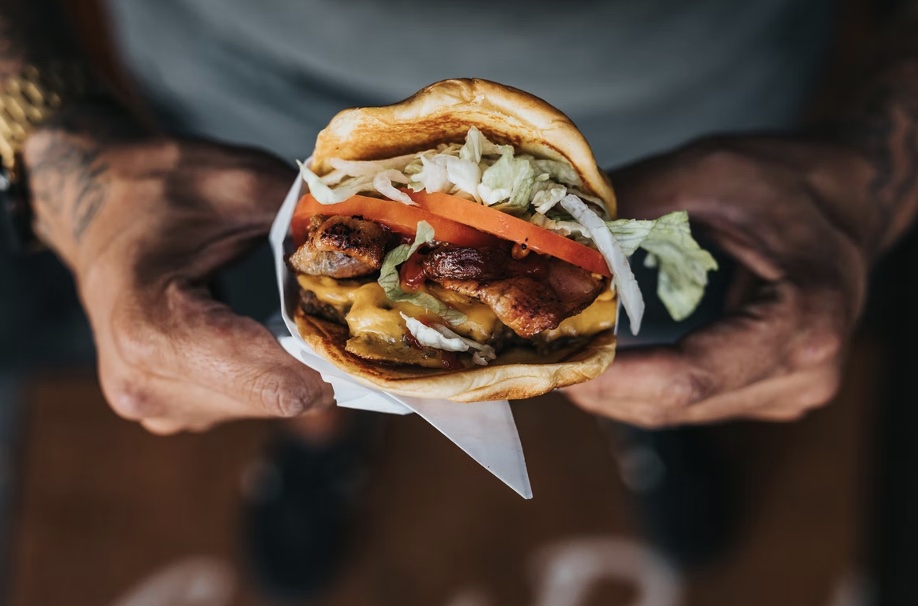[Disclaimer: I’m a musician, and I try hard to find out what works for my body. If you are planning on making large changes to your diet, it’s always important to talk to your doctor. This is not medical advice.]
It can happen so easily. You’re on a tour, and you decide to go out for pizza. The next night, you don’t have many restaurant options open after a gig, and you go out for burgers and chips. Then on your next drive, it’s junk food all day long.
But these kinds of unhealthy eating habits don’t just happen on the road. There’s poor choices lurking around every corner in our society.
You need your body to be in top shape to perform your best — whether that’s playing a concert or taking care of children or going to your office job. But how do you do that in a world designed to lure you with the promise of sugary bliss and processed convenience?
For me, intermittent fasting (IF) has proven to be a great way to keep weight off and promote healthy eating habits, which can be incredibly difficult on the road or during times of high stress. It allows me to stay flexible and realistic, while providing a large number of benefits that go well beyond the waist line.
Unfortunately, while a lot of people have heard of IF, most don’t really know what it is. But don’t worry — we’re going to solve that!
Experts have been creating all kinds of methods so that you can gain the benefits of this eating style no matter your responsibilities and schedule. So let’s explore this exciting way to stay healthy.
What Is Intermittent Fasting?

IF is all about creating extended periods of time where you don’t eat anything at all.
This is usually done in a certain pattern, as we’ll see below. To do it, you simply follow a schedule where there are time windows for eating and ones for fasting.
Remember, we fast every night when we sleep. So IF is really a way to extend that period of time.
Some people hear about this and immediately wave the idea off. Aren’t we supposed to eat three meals a day? If I fast, won’t my body go in starvation mode and not burn any calories? Won’t I be cranky if I don’t eat?
It’s easy to see why people have these concerns. That’s because we have some very mixed up views when it comes to eating.
The truth is, once you get adjusted to IF, you’ll find that your body actually works much better when it isn’t having to digest food all the time. Far from going into “starvation mode,” you get a boost of energy and your body burns more calories (after all, you aren’t fasting for a long period of time). And you quickly get used to fasting, meaning no effect on mood.
IF really shines when you see the way it changes your habits.
The world we live in gives rise to a lot of mindless eating and sedentary activities. We scroll our phones, watch TV, and play video games — often staying up later than we otherwise would to continue being entertained. On top of that, we are snacking all the time while also getting a few big meals a day. Many of these foods are highly processed, delivering plenty of carbohydrates, refined sugar, and fat without many nutrients.
This lifestyle is a major part of our growing health problems in the West. And it’s not your fault! If you find yourself trapped in this loop, you don’t need to blame yourself. Hyperpalatable food and highly entertaining media are designed to get you addicted. But if you are looking for a way out of the loop, IF is one of the most effective ways to do it.
IF breaks through this paradigm. It gives you an opportunity to be mindful about when you eat, and it trains the body to stop constantly seeking out calories just because you are bored.
It makes you more responsive to food, meaning you get full faster when you do eat. And it trains you to be less tempted by food, as you spend a lot of time simply not worrying about it.
What Can I Eat or Drink While Intermittent Fasting?

Fasting is all about what you don’t consume. But there are a few things people can take while in a fasted state, these include:
Water
Black Coffee
Tea (Unsweetened)
Electrolytes
Prescription medication
These are generally considered OK to consume while fasting. However, there are others that will say you really should only consume water.
Coffee and tea (as long as they are taken plain) are great for fasting. They have negligible calories, which means they don’t create an insulin response and knock you out of a fasted state. They also provide caffeine, which is a powerful appetite suppressor. All I can tell you is go slow. When you are in a fasted state, that shot of espresso tends to go a lot further than you’re used to.
Who Shouldn’t Try Intermittent Fasting?
Many physicians warn people against IF if they are:
- Under the age of 18
- Pregnant or trying to become pregnant
- Breastfeeding
- Diabetic
- Have a history of eating disorders
As with any major dietary change, talk to a trusted medical professional before starting!
Benefits of Intermittent Fasting

If you go long periods of not eating and avoid bingeing during the times you are, the most obvious benefit is a reduction in calories.
Let’s face it, the easiest and most effective way to eat fewer calories is to eat less food. This is something that so many fad diets try to avoid saying, but it’s super important.
It turns out that when we have prolonged periods where our body has nothing to digest, it suddenly has lots of energy to do all kinds of things that are great for our overall health.
And without food coming in, your body ends up using less insulin. When insulin drops, your body becomes more sensitive to it, leading to it needing less in the future when you do eat. As insulin goes down, growth hormone typically increases. That allows your body to repair muscle (great if you exercise) and efficiently turn body fat into energy.
Both in scientific literature and anecdotally across the large number of people who’ve tried it, IF can improve:
- Blood pressure
- Memory
- Brain fog
- Energy levels
- Physical performance
Once your body gets used to fasting (i.e. no more getting cranky because you are used to eating all day), you’ll also find you can be so much more productive. It’s amazing how eating not only takes time, it can sap your concentration for hours.
Fasting can also help with food addiction. By changing our relationship to eating, we get in the habit of saying “no” to food. That, more than almost anything else, is the most life changing part of fasting.
Styles of Intermittent Fasting

Remember, IF really is a meal timing plan, not a traditional diet. So the way you fast is all about what timing works best for you.
IF is one of the most convenient ways to stay on top of your eating choices, but only if you pick a plan that matches your life. Below, I’ve put together the three most popular forms. They all have their benefits and drawbacks. The important part is picking the one that you can stick with in the long term.
5:2 (or Eat Stop Eat)
Promoted by nutrition guru Brad Pilon, the Eat Stop Eat method is one of the most popular ways to fast for a very important reason: it’s incredibly easy.
In this method, you simply have two 24-hour fasts in a week. On the other days, you eat normally (that means no giant feasts to celebrate breaking a fast). If you exercise, you might even eat a little above maintenance on non-fasting days.
Eat Stop Eat is helpful in the long term because you can move around your fasting days a bit if you have an event or celebration coming up. And that’s important because it’s not meant to be something you do for a couple months. This is meant to be a lifestyle, not a quick fix. While it won’t make the weight melt off right away, it will gradually bring it down while giving you many benefits of fasting.
For me, it is a bit too restrictive. I typically have too many days a week where I really need to eat. But for others, this is a great way to fit in their fasts reliably.
16/8
The name “16/8” refers to your fasting and eating window every day — 16 hours fasting, 8 hours eating (like only eating from 9 am to 5 pm, or 1 pm to 9 pm, etc.). This keeps you returning to a fasted state frequently, but you don’t have to go an entire day without food. The only major problem is that you have to consistently fast.
That isn’t a big issue for people who have more or less the same schedule from week to week. And the fasting becomes really easy as your body adjusts quickly and gets used to only eating in your time window.
While you might sometimes have to do a little bit of adjusting to fit in special occasions, you can easily get back to your normal schedule.
Because it still lets you eat everyday, many prefer this option. And it’s the one I’ve found the most helpful.
Alternate Day
With Alternate Day fasts, you switch between eating normally and only eating 500 calories every other day.
This definitely gets you fasting! And some people who get in the swing of it really appreciate building in so much food-free time. But it isn’t for everyone.
Due to the high number of days where you will be fasting, it is also not necessarily the most sustainable plan. That being said, everyone’s body is different, and yours might respond well to this pattern.
What to Watch Out For

In health, there are no silver bullets. And IF, while a powerful tool, is not foolproof.
For one, there is a period where your body needs to get used to fasting. If you’ve never done it before, you can expect there to be a few side effects — low energy, fatigue, moodiness, etc. That’s natural, and it does go away. Nevertheless, it should be taken into consideration when you start.
There’s also an art to breaking your fasts. On your first couple of attempts, you’ll probably be super tempted to dive into a massive meal because, after all, you fasted!
But that’s not the best way.
I find that breaking a fast with something light is best. Start slow, giving yourself time to feel full before continuing to eat. If you go slow and steady, you don’t end up eating tons of calories and negating all the good work you’ve done.
How I Use Intermittent Fasting

To balance my digestive, work, and dietary requirements, I find 16/8 works best for me. Especially when I’m on the road, I find that it helps to get some nutrition every day.
I am also vegan (that’s a topic for a whole other post!), which adds another layer onto my choices. When we tour throughout Europe, it makes things very difficult when eating take out. Europeans love their meat and cheese!
Timing all of this can be difficult. But the benefits of IF are so helpful that I’m committed to keeping to it.
In the end, IF brings balance to our eating habits. When a lot of people start fasting, they’re amazed, because they realise they’ve gone years without ever actually feeling hungry. They’ve just been eating meals because it’s that time of day, or eating snacks because they want a little treat. IF brings mindfulness into your kitchen.
Ultimately, reorienting your relationship to food might be the most important benefit of fasting. The fact that it means you can keep a healthy weight while improving your body’s longevity is all a major plus, too.







